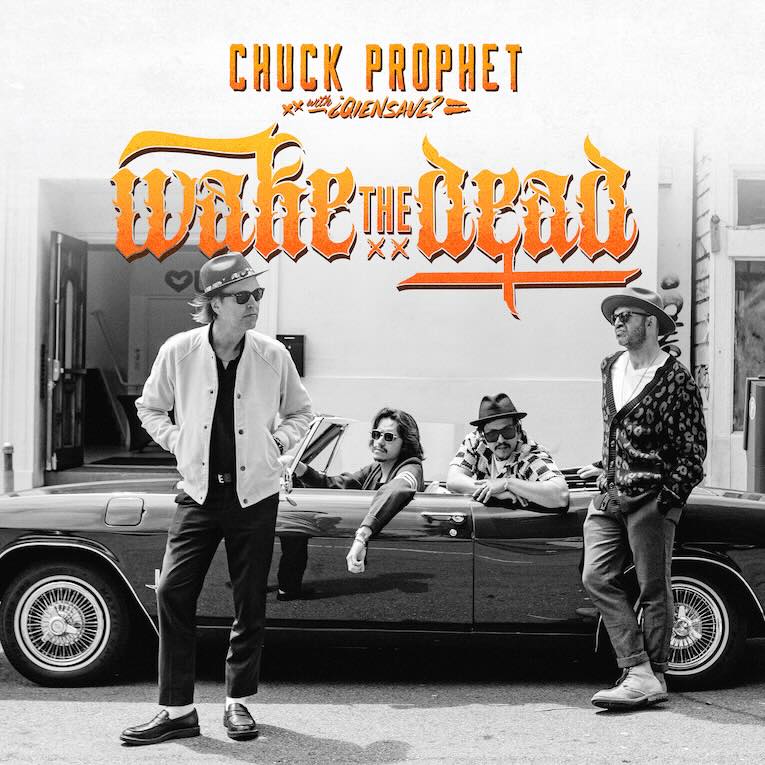
Review: Chuck Prophet & ¿Qiensave? ‘Wake the Dead’
By Hal Horowitz
Whether it was due to San Francisco-bred Chuck Prophet’s time recovering from stage four lymphoma over the past few years, or just an itch to try something different, or perhaps both, is unclear. But the dry-witted veteran singer/songwriter (his days in psychedelic garage rockers Green on Red are far behind him) has shifted, or more correctly enhanced, his approach on this, his 14th (or so) solo album.
While recuperating, Prophet dug deep into Cumbia music, which, as his current bio says “… served as a faithful musical companion and reprieve during his immunotherapy and chemotherapy.” Cumbia, Latin American in origin, is usually played with accordions, a bajo sexto (Mexican 12 string guitar), and perky percussion. Prophet also injects retro-infused Farfisa, organ, Tejano and bolero, along with his rock and roll on these eleven tracks, further expanding the diverse vibe.
On Wake the Dead (out Oct. 25th) his longtime outfit The Mission Express is joined by Cumbia group ¿Qiensave? That concoction exudes a fresh, unique and frequently joyous, not to mention danceable, addition to his already eclectic mix of indie rock, surf, blues and garage music.
The opening title track kicks in as peppy drums and accordion jump out of the bouncy Tex-Mex mix until Prophet enters with his characteristically dry, spoken-sung vocals singing typically poetic/offbeat lyrics of “We might have ourselves a picnic/We might wind up on the moon/We might even give ourselves the third degree.” Even the grouchiest listener will crack a smile with this catchy, lively sound.
The upbeat, often spirited Cumbia effects appear intermittently throughout Wake the Dead. It’s particularly evident on “In the Shadows (for Elon),” likely about Elon Musk, which references space travel with “Now everybody’s gonna have to pay/When he rides his rocket ship away/You’ll find me in the shadows/In the shadows I’ll be found.” The frisky clippity-clop beat with Farfisa, lightens those lyrics considerably.
Elsewhere Prophet brings a hint of Cumbia on “Sally Was a Cop,” an intense song about cartel violence (“Shot in the back in the ditches of Tecate/35 bodies lying in the highway/Children forced to dig the graves of their fathers”) with a stinging guitar solo and backing vocal perfect for audience sing-alongs.
While at least half the tracks borrow some Cumbia stimuli, existing Prophet fans won’t be disappointed since these songs fit, even augment, his established style. He maintains a durable sense of melody, offbeat humor and distinctive vocals while blending the Mission Band with the Latino stimuli of ¿Qiensave?.
A few entries like the lovely ballad “Red Sky Night,” (co-penned by Aaron Lee Tasjan and Kim Richey)– featuring floating, water-logged wah-wah guitar chords, ghostly female vocals, and even strings–could have appeared on any previous release. For the bluesy/slow dance “One Lie for Me, One for You,” only elusive scratched percussion echoes the Cumbia inflections and none of ¿Qiensave? appears. On “Sugar Into Water,” Prophet shifts into Question Mark and the Mysterians “96 Tears” mode with Augie Meyers-tailored roller-rink keyboards pumping under a tune seemingly plucked from the 60s.
The closing sweet ballad “It’s a Good Day to Be Alive” wraps the proceedings on a note of appreciation for things he took for granted before his diagnosis. But Chuck, being who he is, sings wittily “Yeah, it’s a good day to watch a rerun about a witness to a terrible crime/Good day to solve a puzzle/Oh, it’s a good day to be alive” with wry yet sincere nonchalance.
Even at its darkest, the Cumbia sounds combined with Prophet’s songwriting talents create one of his most enjoyable, and certainly most idiosyncratic, collections. “We can take a song/And turn it into gold” he sings, which describes the exuberant Wake the Dead.
Pre-order the album HERE
“Wake The Dead”

Leave A Comment